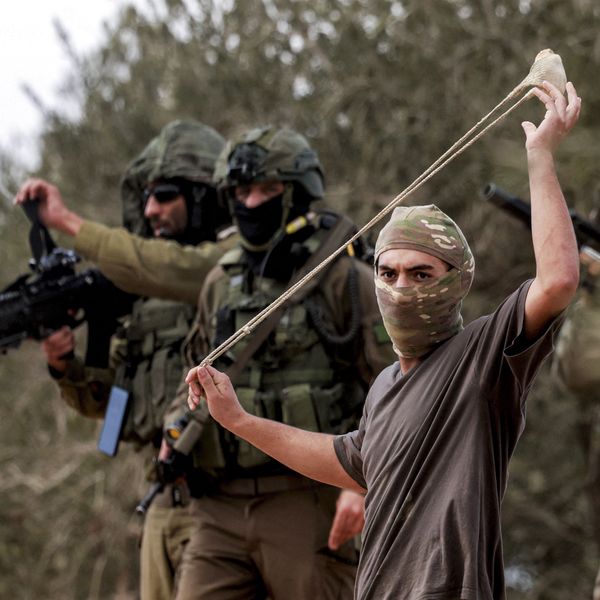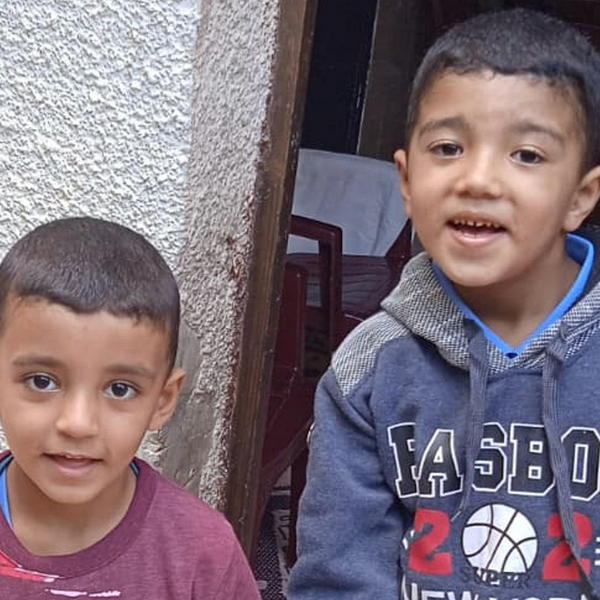Rights Group Hails Video As New Weapon Against Israeli Army
JERUSALEM - Israel's defence minister, Ehud Barak, yesterday promised an inquiry after video footage showed an Israeli soldier shooting baton rounds at a Palestinian detainee who was blindfolded and cuffed."The Israeli military will investigate the incident, learn its lessons and hold those responsible to account," he told MPs from his Labour party. "Warriors do not behave like this."
The advocate general, Brigadier General Avichai Mendelblit, is said to have ordered a military police inquiry after he saw the footage released on Sunday by the Israeli human rights group, B'Tselem. The incident happened on July 7 in Nil'in village. Several other soldiers were present, including a lieutenant colonel who was holding the arm of the Palestinian man.
The man shot, Ashraf Abu Rahma, 27, was treated for an injury to his toe and was then released.
It was the latest incident in which video footage has been used to highlight violence against Palestinians in the occupied West Bank. B'Tselem has been running a project since January last year in which it has given out around 100 video cameras to Palestinians to allow them to film human rights abuses in the West Bank. The Nil'in footage was filmed on a private camera by a 17-year-old girl who lives in the village. B'Tselem has now given her one of its cameras as part of its Shooting Back project.
Sarit Michaeli, spokeswoman for B'Tselem, said the footage was intended as much for an Israeli audience as for an international one. She said spoken or written testimony from Palestinians involved in such cases was often given little weight in official police or military investigations into apparent abuses, but video footage was much more powerful.
"I see no better way of encouraging accountability among members of the security forces," said Michaeli.
(c) 2008 The Guardian
An Urgent Message From Our Co-Founder
Dear Common Dreams reader, The U.S. is on a fast track to authoritarianism like nothing I've ever seen. Meanwhile, corporate news outlets are utterly capitulating to Trump, twisting their coverage to avoid drawing his ire while lining up to stuff cash in his pockets. That's why I believe that Common Dreams is doing the best and most consequential reporting that we've ever done. Our small but mighty team is a progressive reporting powerhouse, covering the news every day that the corporate media never will. Our mission has always been simple: To inform. To inspire. And to ignite change for the common good. Now here's the key piece that I want all our readers to understand: None of this would be possible without your financial support. That's not just some fundraising cliche. It's the absolute and literal truth. We don't accept corporate advertising and never will. We don't have a paywall because we don't think people should be blocked from critical news based on their ability to pay. Everything we do is funded by the donations of readers like you. Will you donate now to help power the nonprofit, independent reporting of Common Dreams? Thank you for being a vital member of our community. Together, we can keep independent journalism alive when it’s needed most. - Craig Brown, Co-founder |
JERUSALEM - Israel's defence minister, Ehud Barak, yesterday promised an inquiry after video footage showed an Israeli soldier shooting baton rounds at a Palestinian detainee who was blindfolded and cuffed."The Israeli military will investigate the incident, learn its lessons and hold those responsible to account," he told MPs from his Labour party. "Warriors do not behave like this."
The advocate general, Brigadier General Avichai Mendelblit, is said to have ordered a military police inquiry after he saw the footage released on Sunday by the Israeli human rights group, B'Tselem. The incident happened on July 7 in Nil'in village. Several other soldiers were present, including a lieutenant colonel who was holding the arm of the Palestinian man.
The man shot, Ashraf Abu Rahma, 27, was treated for an injury to his toe and was then released.
It was the latest incident in which video footage has been used to highlight violence against Palestinians in the occupied West Bank. B'Tselem has been running a project since January last year in which it has given out around 100 video cameras to Palestinians to allow them to film human rights abuses in the West Bank. The Nil'in footage was filmed on a private camera by a 17-year-old girl who lives in the village. B'Tselem has now given her one of its cameras as part of its Shooting Back project.
Sarit Michaeli, spokeswoman for B'Tselem, said the footage was intended as much for an Israeli audience as for an international one. She said spoken or written testimony from Palestinians involved in such cases was often given little weight in official police or military investigations into apparent abuses, but video footage was much more powerful.
"I see no better way of encouraging accountability among members of the security forces," said Michaeli.
(c) 2008 The Guardian
JERUSALEM - Israel's defence minister, Ehud Barak, yesterday promised an inquiry after video footage showed an Israeli soldier shooting baton rounds at a Palestinian detainee who was blindfolded and cuffed."The Israeli military will investigate the incident, learn its lessons and hold those responsible to account," he told MPs from his Labour party. "Warriors do not behave like this."
The advocate general, Brigadier General Avichai Mendelblit, is said to have ordered a military police inquiry after he saw the footage released on Sunday by the Israeli human rights group, B'Tselem. The incident happened on July 7 in Nil'in village. Several other soldiers were present, including a lieutenant colonel who was holding the arm of the Palestinian man.
The man shot, Ashraf Abu Rahma, 27, was treated for an injury to his toe and was then released.
It was the latest incident in which video footage has been used to highlight violence against Palestinians in the occupied West Bank. B'Tselem has been running a project since January last year in which it has given out around 100 video cameras to Palestinians to allow them to film human rights abuses in the West Bank. The Nil'in footage was filmed on a private camera by a 17-year-old girl who lives in the village. B'Tselem has now given her one of its cameras as part of its Shooting Back project.
Sarit Michaeli, spokeswoman for B'Tselem, said the footage was intended as much for an Israeli audience as for an international one. She said spoken or written testimony from Palestinians involved in such cases was often given little weight in official police or military investigations into apparent abuses, but video footage was much more powerful.
"I see no better way of encouraging accountability among members of the security forces," said Michaeli.
(c) 2008 The Guardian

